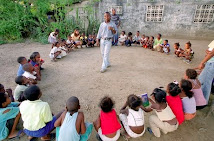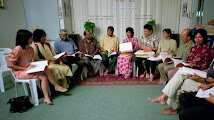Regarding the realization of unity between peoples and individuals - in terms of mutuality and justice - the first of the quotations below could be said to illustrate this principle on a more superficial level, the second on a deeper one.
A sustainable social order is distinguished, among other things, by an ethic of reciprocity and balance at all levels of human organization. A relevant analogy is the human body: here, millions of cells collaborate to make human life possible. The astounding diversity of form and function connects them in a lifelong process of giving and receiving. It represents the highest expression of unity in diversity.
(Bahá'í International Community statement of 3 May 2010: Rethinking Prosperity: Forging Alternatives to a Culture of Consumerism)
The great mass of humanity does not exercise real love and fellowship. The elect of humanity are those who live together in love and unity. They are preferable before God because the divine attributes are already manifest in them...View photo source here.
[...] believers whose characteristics are agreement, fellowship and love. The Bahá’í friends in Persia attained such a brotherhood and love that it really became a hindrance in the conduct of material affairs. Each one into whatever house of the friends he went considered himself the owner of the house, so to speak. There was no duality but complete mutuality of interests and love. The visiting friend would have no hesitation in opening the provision box and taking out enough food for his needs. They wore each other’s clothes as their own when necessary. If in need of a hat or cloak, they would take and use it. The owner of the clothing would be thankful and grateful that the garment had gone. When he returned home, he would perhaps be told, “So and so was here and took away your coat.” He would reply, “Praise be to God! I am so grateful to him. Praise be to God! I am so thankful I have been given this opportunity of showing my love for him.”
To such an extreme degree this love and fellowship expressed itself that Bahá’u’lláh commanded that no one should take possession of another’s belongings unless presented with them. The intention is to show to what an extent unity and love prevailed among the Bahá’í friends in the East.
I hope that this same degree and intensity of love may become manifest and apparent here; that the spirit of God shall so penetrate your hearts that each one of the beloved of God shall be considered as all; that each one may become a cause of unity and center of accord and all mankind be bound together in real fellowship and love.
('Abdu'l-Bahá, PUP 208-9)


